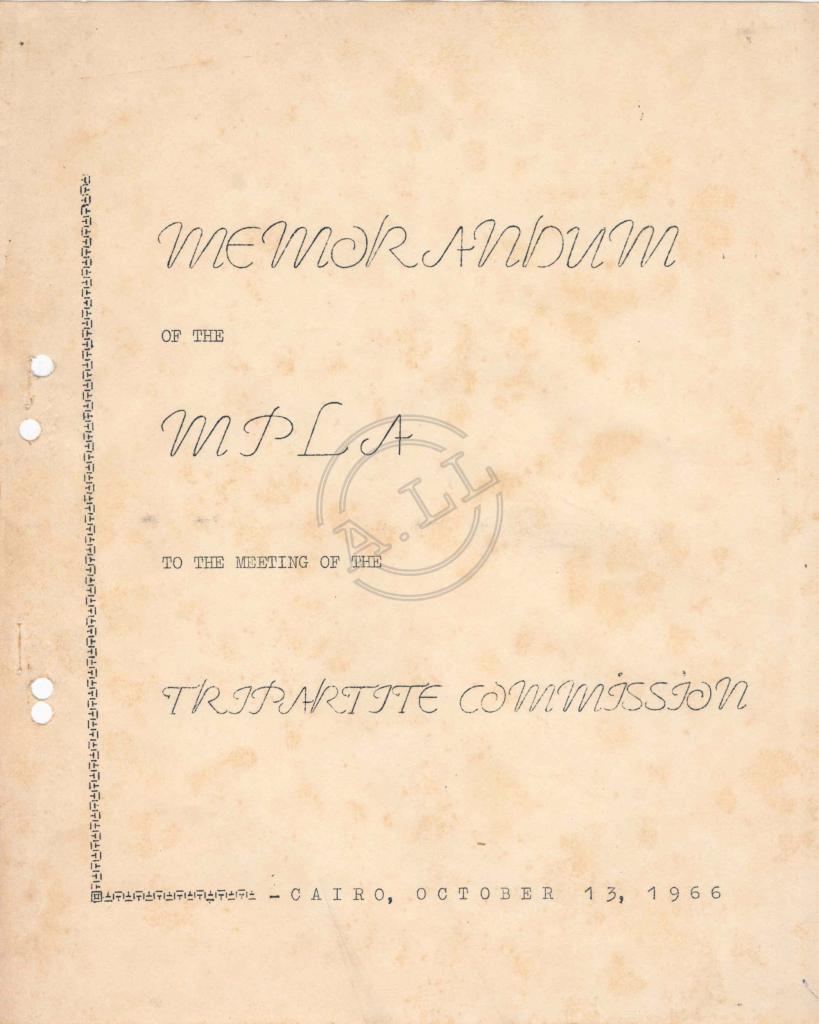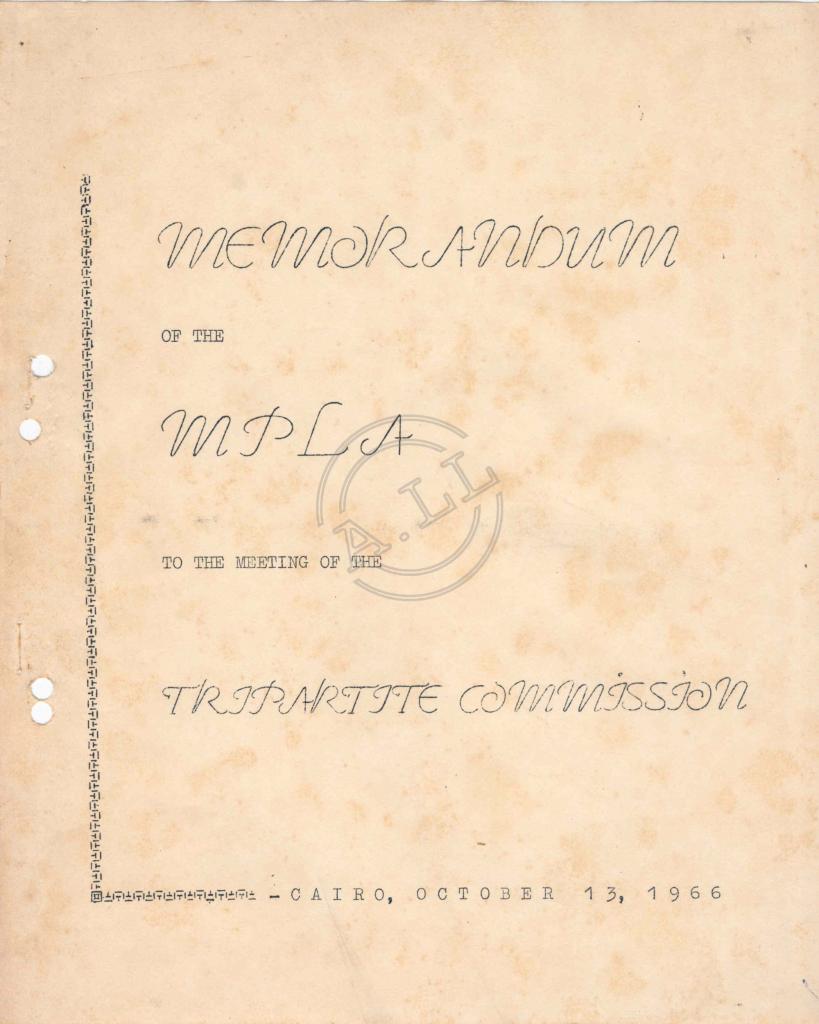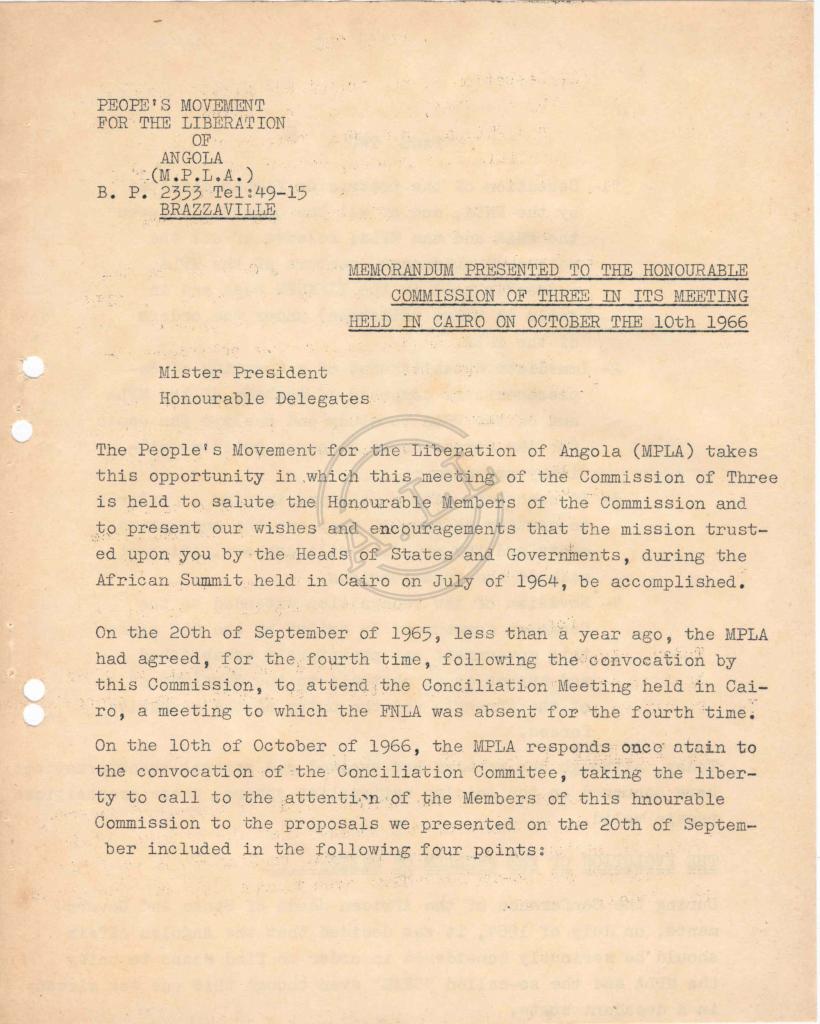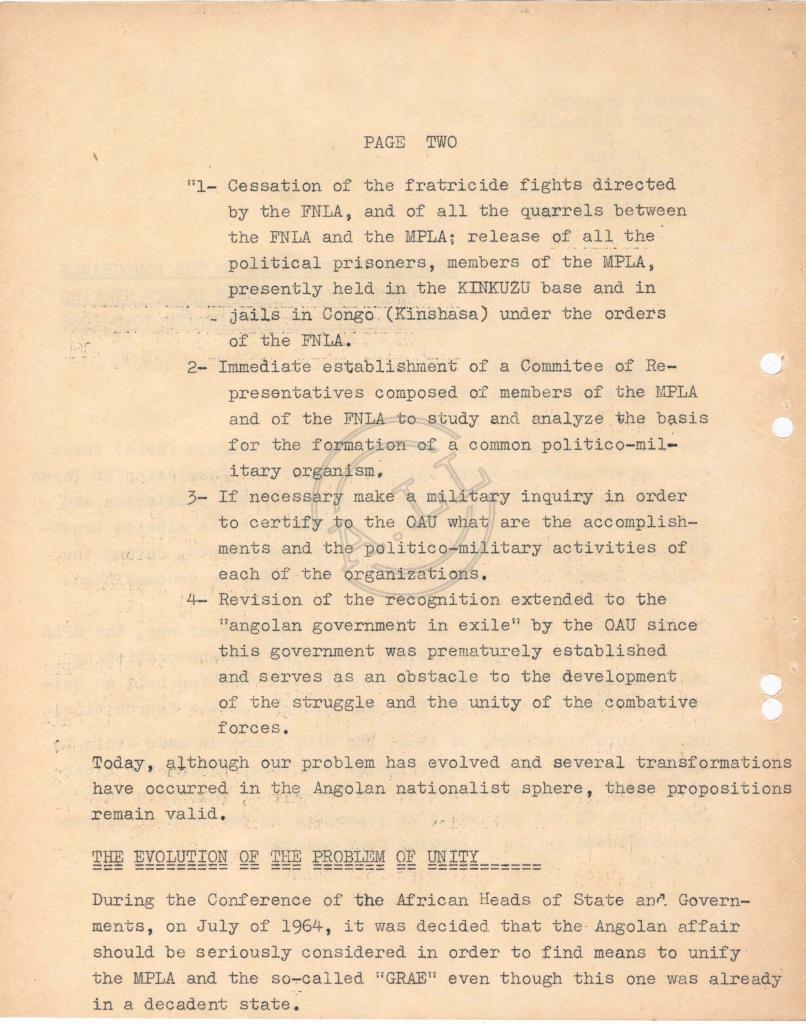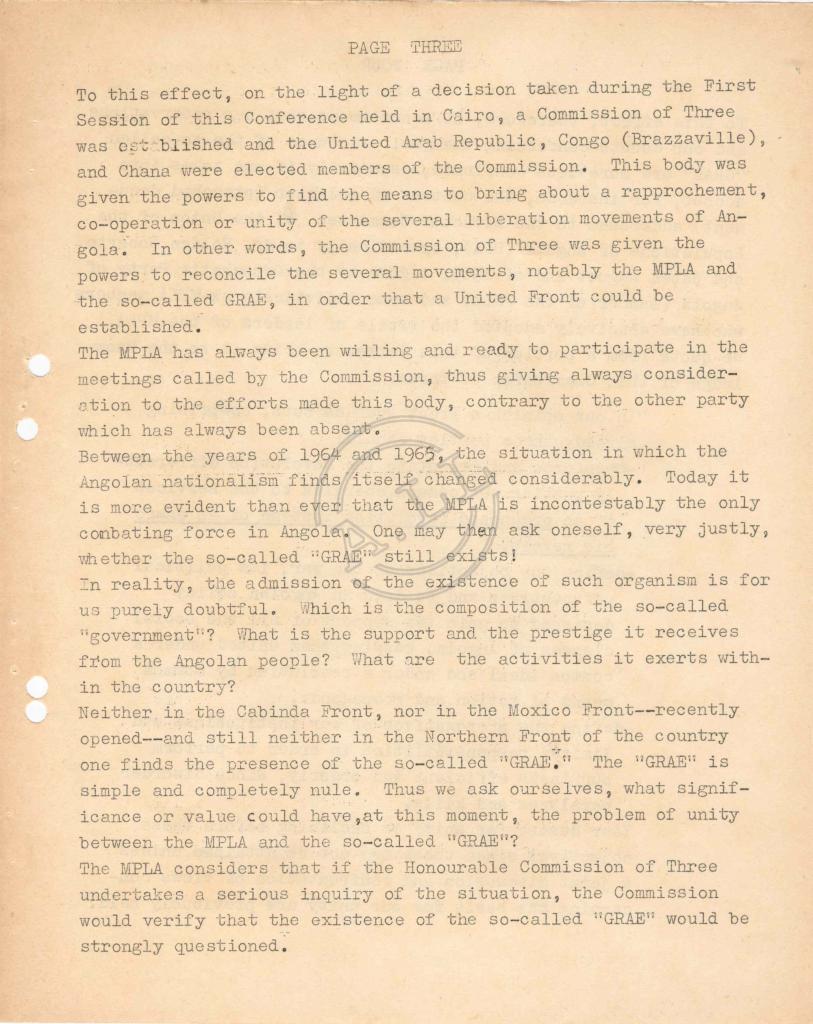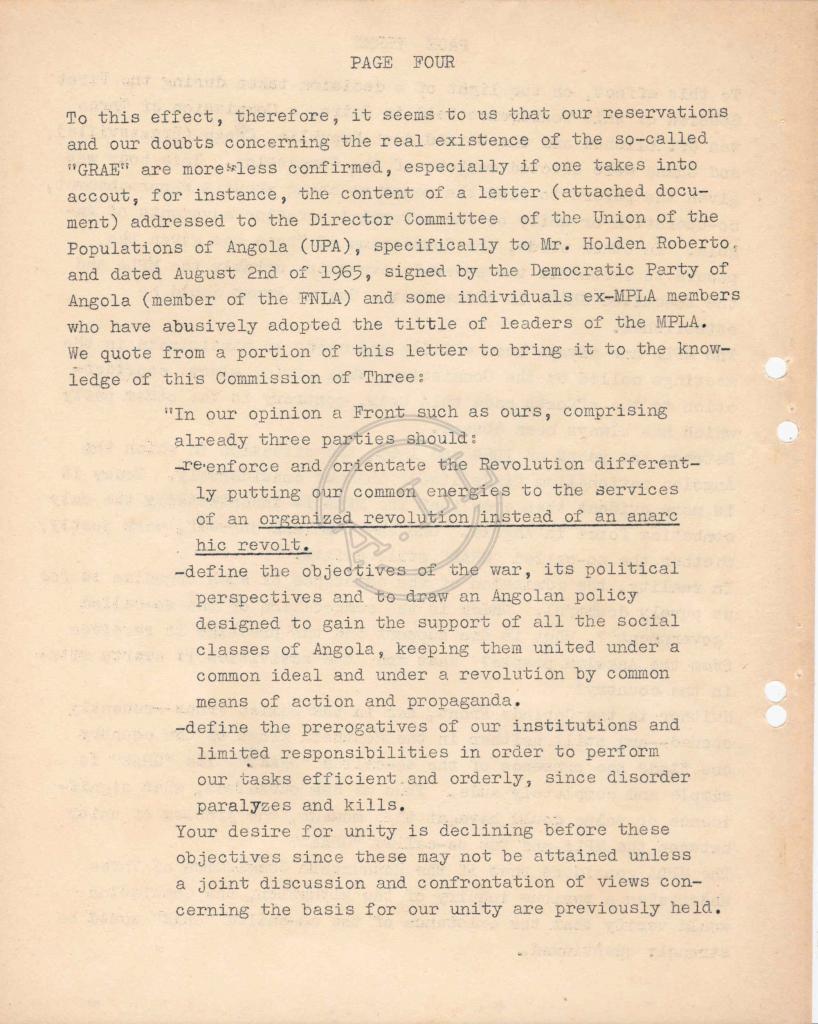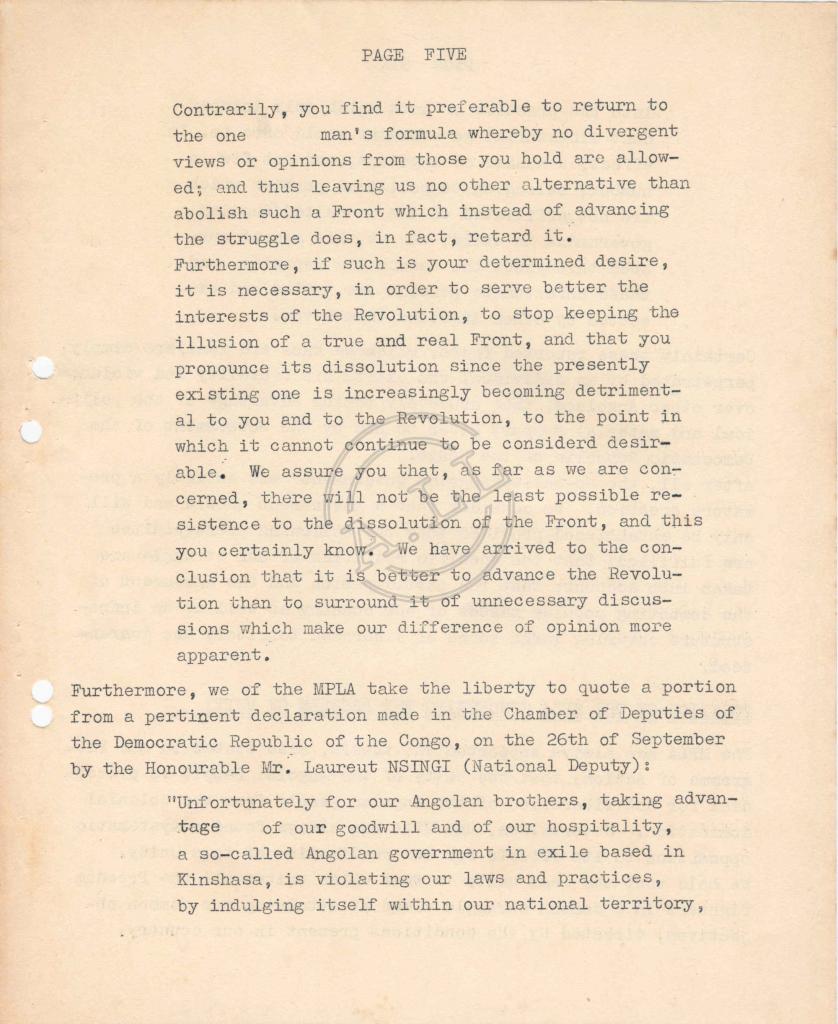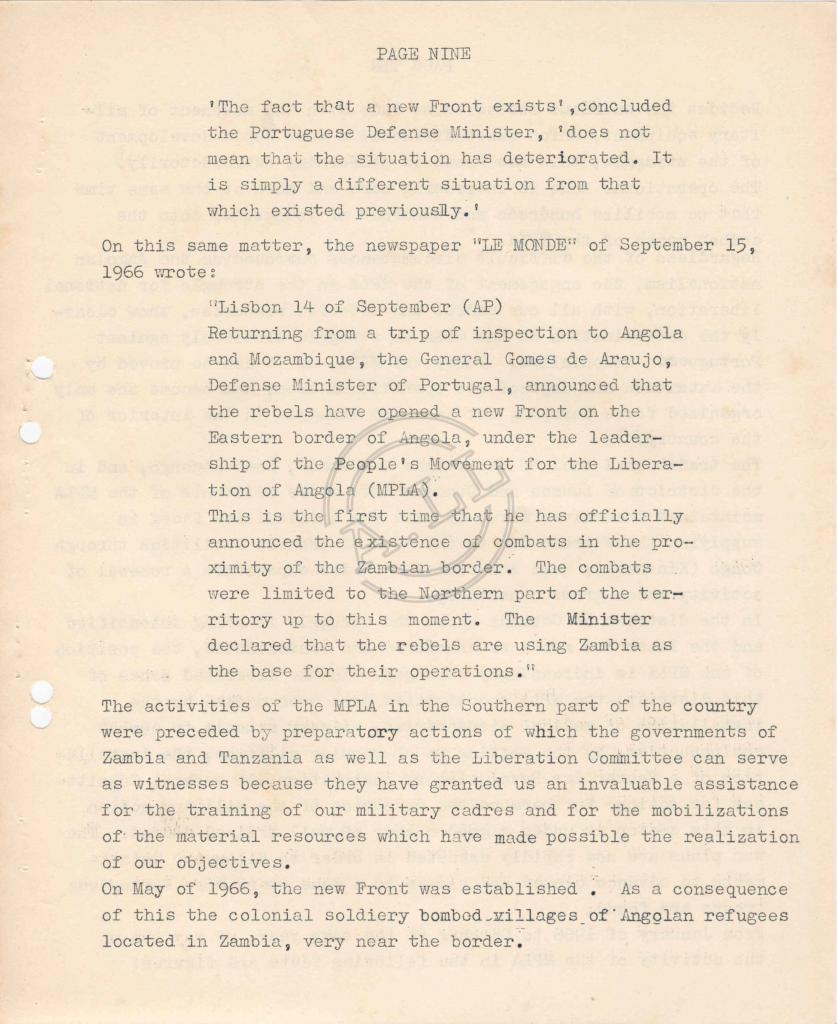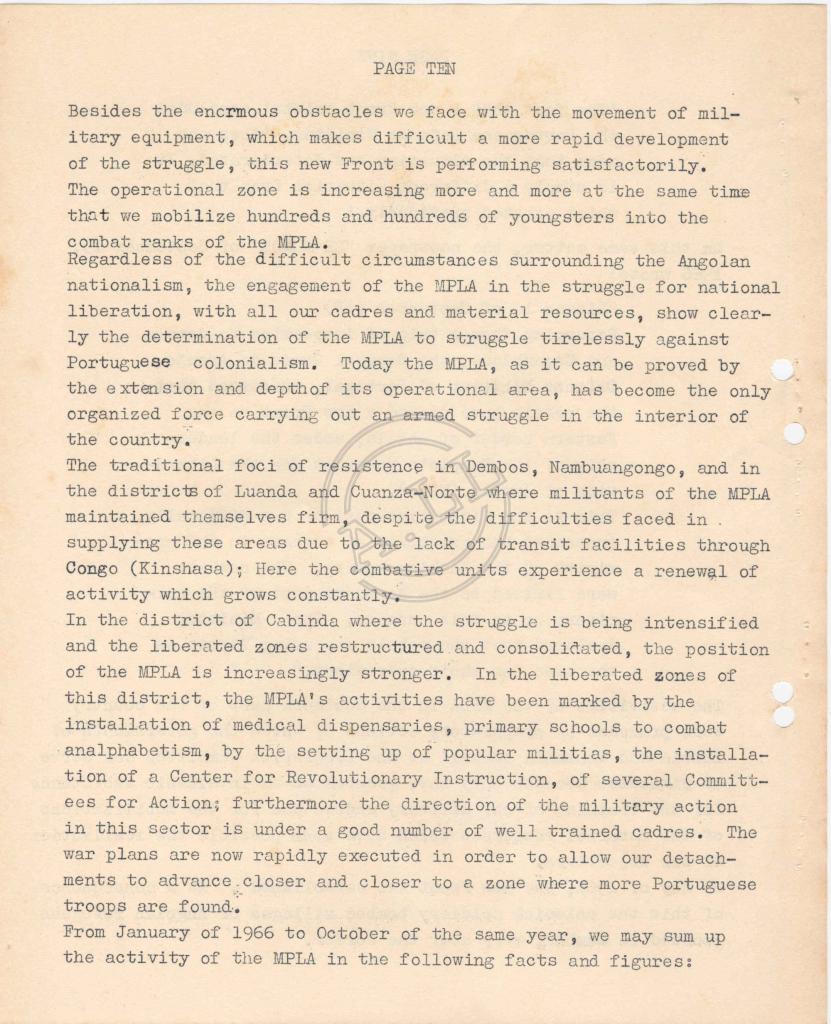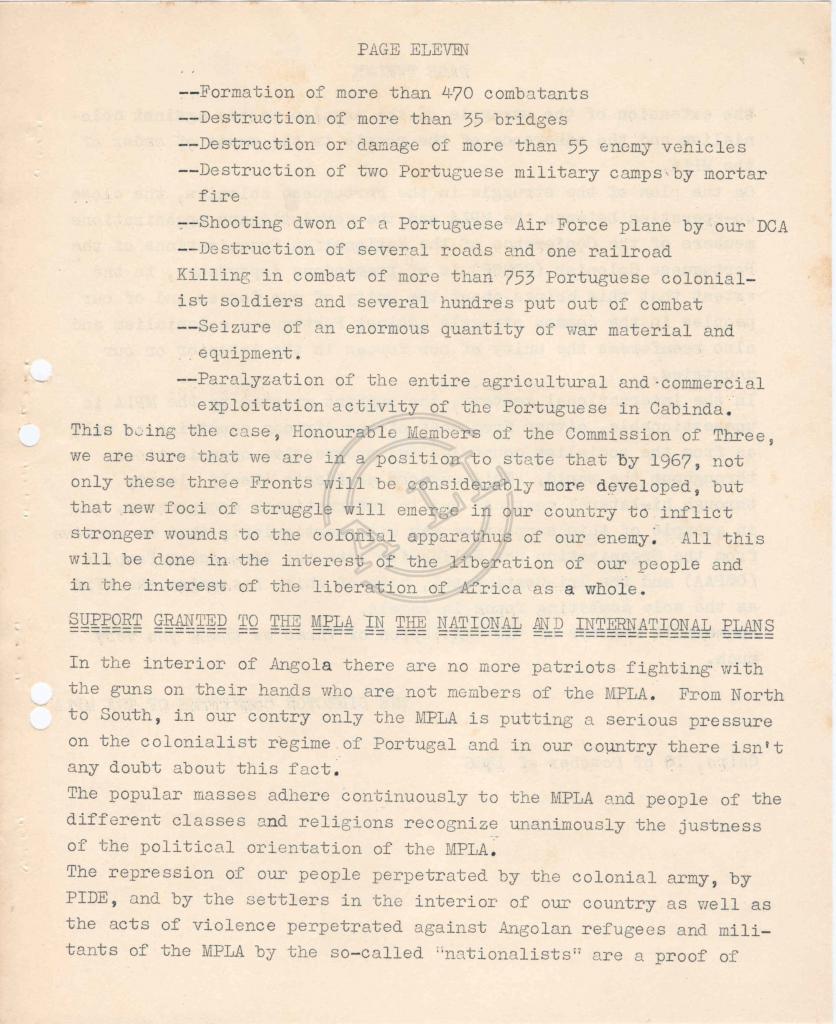Cota
0087.000.006
Tipologia
Memorando
Impressão
Policopiado
Suporte
Papel Comum
Autor
MPLA - Movimento Popular de Libertação de Angola
Data
Idioma
Conservação
Bom
Fundo
Imagens
13
MEMORANDUM OF THE MPLA TO THE MEETING OF THE TRIPARTITE COMMISSION
- CAIRO, OCTOBER 13, 1966
---
PEOPLE’S MOVEMENT FOR THE LIBERATION
OF ANGOLA (M.P.L.A)
B. P. 2353 TEL: 49-15
BRAZZAVILLE
MEMORANDUM PRESENTED TO THE HONOURABLE
COMISSION O THREE IN ITS MEETING
HELD IN CAIRO ON OCTOBER THE 10TH 1966
Mister President
Honourable Delegates
The People’s Movement for the Liberation of Angola (MPLA) takes this opportunity in which this meeting of the Commission of Three is held to salute the Honourable Members of the Commission and to present our wishes and encouragements that the mission trusted upon you by the Heads of States and Governments, during the African Summit held in Cairo on July of 1964, be accomplished.
On the 20th of September of 1965, less than a year ago, the MPLA has agreed, for the fourth time, following the convocation by this Commission, to attend the Conciliation Meeting held in Cairo, a meeting to which the FNLA was absent for the fourth time.
On the 10th of October of 1966, the MPLA responds once again to the convocation of the Conciliation Committee, taking the liberty to call to the attention of the Members of this honourable Commission to the proposals we presented on the 20th of September included in the following four points:
Besides the innumerable obstacles we face with the movement of military equipment, which makes difficult a more rapid development of the struggle, this new Front is performing satisfactorily. The operational zone is increasing more and more at the same time that we mobilize hundreds and hundreds of youngsters into the combat ranks of the MPLA.
Regardless of the difficult circumstances surrounding the Angolan nationalism, the engagement of the MPLA in the struggle for national liberation, with all our cadres and material resources, show clearly the determination, with all our cadres and material resources, show clearly the determination of the MPLA to struggle tirelessly against Portuguese colonialism. Today the MPLA, as it can be proved by the extension and depth of its operational area, has become the only organized force carrying out an armed struggle in the interior of the country.
The traditional force of resistance in Dembos, Nambuangongo, and in the districts of Luanda and Cuanza-Norte where militants and the MPLA maintained themselves firm, despite the difficulties faced in supplying these areas due to the lack of transit facilities through Congo (Kinshasa); Here the combative units experience a renewal of activity which grows constantly.
In the district of Cabinda where the struggle is being intensified and to liberated zones restructured and consolidated, the position of the MPLA is increasing stronger. In the liberated zones of this district, the MPLA is increasingly stronger. In the liberated zones of this district, the MPLA’s activities have been marked by the installation of medical dispensaries, primary schools to combat analphabetism, by the setting up of popular militants, the installation of a Center for Revolutionary Instruction, of several Committees for Action; furthermore the direction of the military action in this sector is under a good number of well-trained cadres. The war plans are now rapidly executed in order to allow our detachments to advance closer and closer to a zone where more Portuguese troops were found.
From January of 1966 to October of the same year, we may sum up the activity of the MPLA in the following facts and figures:
--Formation of more than 470 combatants
--Destruction of more than 35 bridges
--Destruction or damage of more than 55 enemy vehicles
--Destruction of two Portuguese military camps by mortar fire
--Shooting down of a Portuguese Air Force plane by our DCA
--Destruction of several roads and more railroad Killing in combat of more than 753 Portuguese colonialist soldiers and several hundred put out of combat
--Seizure of an enormous quantity of war material and equipment.
--Stoppage of the entire agricultural and commercial exploitation activity of the Portuguese in Cabinda.
This being the case, Honourable Members of the Commission of Three, we are sure that we are in a position to state that by 1967, not only these three Fronts will be considerably more developed, but that new forces of struggle will emerge in our country to inflict stronger wounds to the colonial apparatus of our enemy. All this will be done in the interest of the liberation of our people and in the interest of the liberation of Africa as a whole.
SUPPORT GRANTED TO THE MPLA IN THE NATIONAL AND INTERNATIONAL PLANS
In the interior of Angola there are no more patriots fighting with the guns on their hands who are not members of the MPLA. From North to South, in our country only the MPLA is putting a serious pressure on the Colonialist regime of Portugal, and in our country there isn’t any doubt about this fact.
The popular masses adhere continuously to the MPLA and people of the different classes and religions recognize unanimously the justness of the political orientation of the MPLA.
The repression of our people perpetrated by the colonial army, by the PIDE, and by the settlers in the interior of our country as well as the acts of violence perpetrated against Angolan refugees and militants of the MPLA by the so-called “nationalists” are proof of the extension of the struggle of the Angolan people against colonialism and the adherence of the people to the words of order of the MPLA.
On the plan of the struggle in Portuguese colonies, in the close co-operation between the MPLA and the revolutionary organizations members of the Conference of the Nationalist Organizations of the Portuguese Colonies (CONCP) is of tremendous importance, to the extent that this brings about the unity of our peoples in the unity of our forces and our people in the common struggle against Portuguese colonialism and also re-enforces the unity of our forces in the interior of our countries.
In the international context, the support granted to the MPLA is unquestionable, either from most of the African countries as well as from the socialist countries and progressive organizations throughout the world. This support manifests itself clearly through bi-lateral contacts and international conferences. As an example of this support we may cite particularly that we receive from the Organization for Solidarity with the Afro-Asian People (OSPAA) and the Tri-Continental, both of which recognize the MPLA as the sole combating force in Angola.
Honourable Members of the Commission of the Three we thank you very much.
THE DIRECTOR COMMITTEE OF THE MPLA
Cairo, 10 of October of 1966
1-Cessation of the fratricide fights directed by the FNLA, and of all the quarrels between the FNLA and the MPLA; release of all the political prisoners, members of the MPLA, presently held in the KINKUZU base and in jails in Congo (Kinshasa) under the orders of the FNLA.
2- Immediate establishment of a Committee of Representatives composed of members of the MPLA and of the FNLA to study and analyse the basis for the formation of a common politico-military organism.
3- If necessary make a military inquiry in order to certify to the OAU what are the accomplishments and the politico-military activities of each of the organizations.
4- Revision of the recognition extended to the “angolan government in exile” by the OAU since this government was prematurely established and serves as an obstacle to the development of the struggle and the unity of the combative forces.
Today, although our problem has evolved and several transformations have occurred in the Angolan nationalist sphere, these propositions remain valid.
THE EVOLUTION OF THE PROBLEM OF UNITY
During the conference of the African Heads of State and Governments, on July 1964, it was decided that the Angolan affair should be seriously considered in other to find means to unify the MPLA and the so-called “GRAE” even though this one was already in a decadent state.
To this effect, on the light of a decision taken during the First Session of this Conference held in Cairo, a Commission of Three was established and the United Arab Republic, Congo (Brazzaville), and Chana were elected members of the Commission. This body was given the powers to find the means to bring about a rapprochement, co-operation or unity of the several liberation movements of Angola. In other words, the Commission of Three was given the powers to reconcile the several movements, notably the MPLA and the so-called GRAE, in order that a United Front could be established.
The MPLA has always been willing and ready to participate in the meetings called by the Commission, thus giving always consideration to the efforts made this body, contrary to the other party which has always been absent.
Between the years of 1964 and 1965, the situation in which the Angolan nationalism finds itself changed considerably. Today it is more evident than ever that the MPLA is incontestably the only combating force in Angola. One may then ask oneself, very justly, whether the so-called “GRAE” still exists!
In reality, the admission of the existence of such organism is for us purely doubtful. Which is the composition of the so-called “government”? What is the support and the prestige it receives from the Angolan people? What are the activities it exerts within the country?
Neither in the Cabinda Front, nor in the Moxico Front - recently opened - and still neither in the Northern Front of the country one finds the presence of the so-called “GRAE”. The “GRAE” is simple and completely null. Thus we ask ourselves, what significance or values could have, at this moment, the problem of unity between the MPLA and the so-called “GRAE”?
The MPLA considers that if the Honourable Commission of Three undertakes a serious inquiry of the situation, the Commission would verify that the existence of the so-called “GRAE” would be strongly questioned.
To this effect, therefore, it seems to us that our reservations and our doubts concerning the real existence of the so-called “GRAE” are more or less confirmed, especially if one takes into account, for instance, the content of a letter (attached document) addressed to the Director Committee of the Union of the Populations of Angola (UPA), specifically to Mr. Holden Roberto, and dated August 2nd of 1965, signed by the Democratic Party of Angola (member of the FNLA) and some individuals ex-MPLA members who have abusively adopted the tittle of leaders of the MPLA. We quote from a portion of this letter to bring it to the knowledge of this Commission of Three:
“In our opinion a Front such as ours, comprising already three parties should:
- Re-enforce and orientate the Revolution differently putting our common energies to the services of an organized revolution instead of an anarchic revolt.
- Define the objectives of the war, its political perspectives and to draw an Angolan policy designed to gain the support of all the social classes of Angola, keeping them united under a common ideal and under a revolution by common means of action and propaganda.
- Define the prerogatives of our institutes and limited responsibilities in order to perform our tasks efficient and orderly, since disorder paralyzes and kills.
Your desire for unity is declining before these objectives since these may not be attained unless a joint discussion and a confrontation of views concerning the basis for our unity are previously held.
Contrarily, you find it preferable to return to the one man’s formula whereby no divergent views or opinions from those you hold are allowed; and thus leaving us no other alternative than abolish such Front which instead of advancing the struggle does, in fact, retard it.
Furthermore, if such is your determined desire, it is necessary, in order to serve better the interests of the Revolution, to stop keeping the illusion of a true and real Front, and that you pronounce its dissolution since the presently existing one is increasingly be which it cannot continue to be considered desirable. We assure you that, as far as we are concerned, there will not be the least possible resistance to the dissolution of the Front, and this you certainly know. We have arrived to the conclusion that it is better to advance the Revolution than to surround it of unnecessary discussions which make our difference of opinion more apparent.
Furthermore, we of the MPLA take the liberty to quote a portion from a pertinent declaration made in the Chamber of Deputies of the Democratic Republic of the Congo, on the 26th of September by the Honourable Mr. Laurent NSINGI (National Deputy):
“Unfortunately for our Angolan brothers, taking advantage of our goodwill and our hospitality, a so-called Angolan government in exile based in Kinshasa, is violating our laws and practices, by indulging itself within our national territory, into the practice of acts which only independent dictatorial governments would dare to. In effect, a number of Angolans; and not few in number; belonging to political parties which are not affiliated to the so-called “Angolan government in exile”, are at this moment pursued throughout the Democratic Republic, and these unfortunate persons are jailed and executed by other Angolans themselves.
Certainly this reported facts, which we know are real, are simply perpetrated by and individual who exerts his brutality and violence over other Angolans, thus abusively taking advantage of the political and material support given to him by the Government of the Democratic Republic of the Congo.
After all, the so-called “Angolan government” was entirely a premature creation. We consider that a government should and will only be established provided that the following prerequisites are fulfilled: that the specific realities of our struggle are taken into account; that the participation and the agreement of the combating popular masses of our country as well as an infrastructure covering large zones of liberated territory are guaranteed.
POSITION OF THE MPLA CONCERNING THE PROBLEM OF UNITY
The MPLA has always supported the thesis, also stated in our Programme of Action, that the Unity of the Angolan People is primordial for the liberation of the Angolan people from the colonial domination. Nevertheless, the MPLA has always found a systematic opposition to its efforts for the realization of this unity. We hold that the real unity is that which unites all the freedom fighters in a common struggle aimed at attaining our common objectives, directed by the conditions present in our country.
Regardless of all the vicissitudes we faced in the history of our search for Unity, the MPLA declares once again we are prepared to do outmost in order to find the adequate basis to bring about a Unity categorically revolutionary.
POPOSITIONS
Thus is order to succeed in bringing about a Unity with the FNLA the MPLA proposes the following:
a)- Revision of the recognition of the so-called “GRAE” by the OAU in
order to facilitate the Unity.
b)- Immediate release of all the MPLA militants jailed, in the territory of Congo (Kinshasa) under the orders of the so-called “GRAE”. Cessation of all the persecutions, imprisonments, and physical eliminations of Angolans, members of the MPLA, in the Kinkuzu base.
c)- Cessation of any anti-MPLA propaganda by the so-called GRAE
among the Angolan refugees in Congo (Kinshasa).
d)- Make an inquiry into the activities of the MPLA and of the so-called GRAE
In order to determine whether the so-called GRAE really exists.
e)- Set up a Mixed Commission of Representatives of the MPLA and of the so-called GRAE in order to establish the basis for the formation of a common politico-military organism.
THE EVOLUTION OF THE ANGOLAN PROBLEM AND THE DEVELOPMENT OF THE STRUGGLE FOR INDEPENDANCE OF ANGOLA UNDER THE DIRECTION OF THE M.P.L.A
IF in 1965 the MPLA could develop its activities in the Angolan district of Cabinda, the year of 1966 can be characterized primarily as the year of the preparations and the opening of a new Front in the Southern part of the territory; this event has considerably threatened the colonial defensive system of Portugal as well as opened new perspectives for the struggle of our people, as the following statement by a Portuguese official clearly demonstrates:
“Lisbon, 13 of September (AFP) The Defense Minister, General Gomes de Araujo has confirmed today the existence of a new Front in Angola, near the Zambian border. The Portuguese Minister who has just returned from a visit of inspection to Mozambique and Angola, declared, in answer to a question, writes the “DIÁRIO DE LISBOA” that ‘due to the infiltration of the elements of the MPLA (People’s Movement for the Liberation of Angola) through the Zambian border with Angola, we are forced to intensify the surveillance along the line dividing the two territories.’
To the question as to whether a new phase of the struggle had been started, General Gomes de Araujo replied ‘No. The MPLA not having been able to succeed in Cabinda is trying to launch its aggression in the Southern zone of Angola by infiltrating its elements using Zambia as their base.’
“The fact that a new front exists’, concluded the Portuguese Defense Minister, ‘does not mean that the situation has deteriorated. It is simply a different situation from that which existed previously.’
On this matter, the newspaper “LE MONDE” of September 15, 1966 wrote:
“Lisbon 14 of September (AP)
Returning from a trip of inspection to Angola and Mozambique, the General Gomes Araujo, Defense Minister of Portugal, announced that the rebels have opened a new Front on the Eastern border of Angola, under the leadership of the people’s Movement for the Liberation of Angola (MPLA).
This is the first time that he has officially announced the existence of combats in the proximity of the Zambian border. The combats were limited to the Northern part of the territory up to this moment.The Minister declared that the rebels are using Zambia as the basefor their operations.”
The activities of the MPLA in the Southern part of the country were preceded by preparatory actions of which the government of Zambia and Tanzania as well as the Liberation Committee can serve as witnesses because they have granted us an invaluable assistance for the training of our military cadres and for the mobilizations of the material resources which have made possible the realization of our objectives.
On may of 1966, the new Front was established. As a consequence of this the colonial soldiery bombed villages of Angolan refugees located in Zambia, very near the border.
«Memorandum of the MPLA to the meeting of the Tripartite Commission, Cairo» (Cairo)
A publicação, total ou parcial, deste documento exige prévia autorização da entidade detentora.
